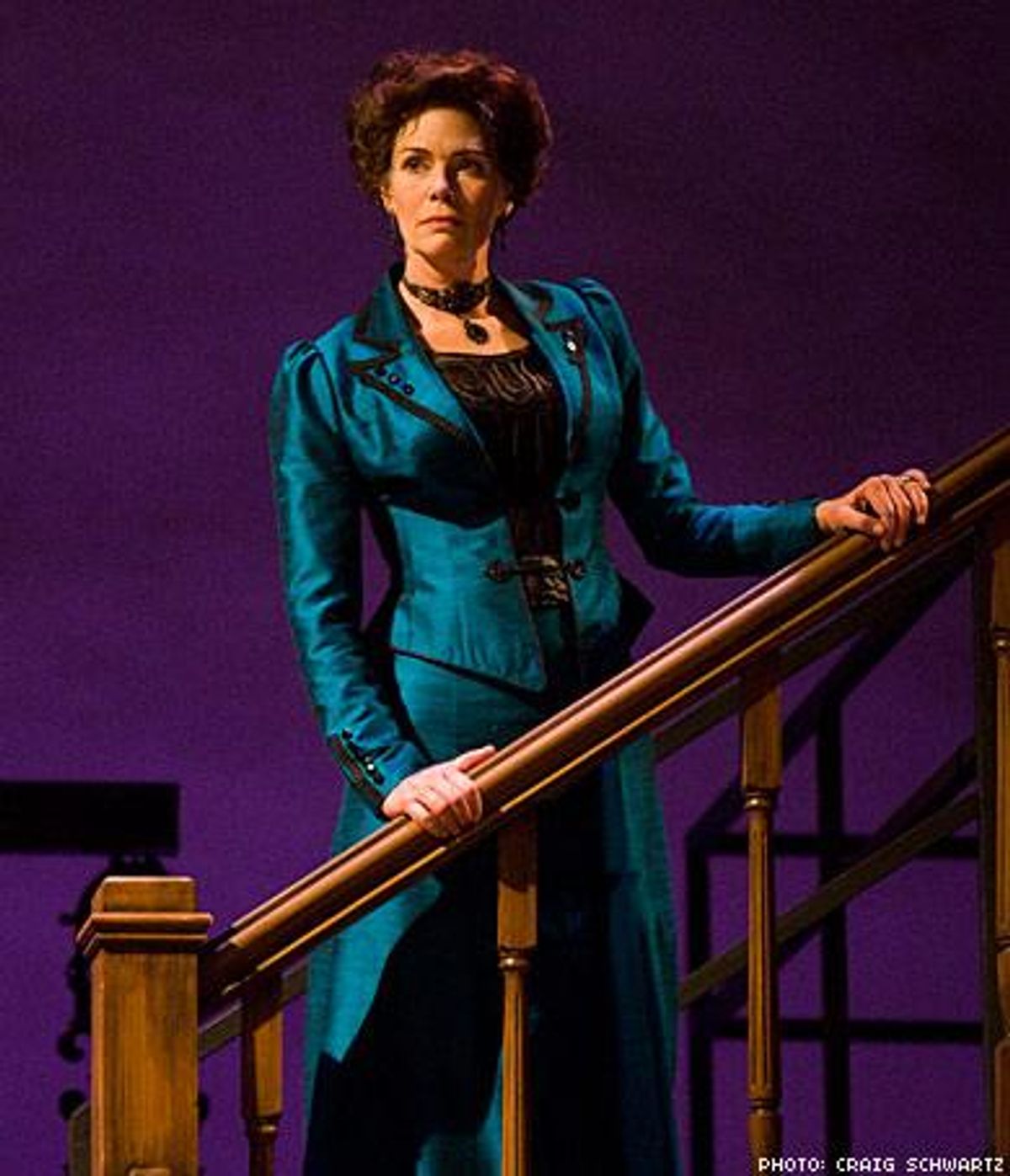The Little Foxes
is a play with a lot to say -- about rapacious business
practices, exploitation of the poor, and gender politics -- and
70 years after its Broadway bow, it's still delivering its
message effectively.
Newly out actress Kelly
McGillis heads a strong cast in the Pasadena Playhouse's
excellent production of the Lillian Hellman classic, directed
by Damaso Rodriguez. In the program notes, Rodriguez
comments that
The Little Foxes
"shockingly reflects our times," and the action onstage
proves him right. With their greed and treachery, Hellman's
Gilded Age little foxes would likely fit right in with the big,
bad wolves at some of today's too-large-to-fail companies.
The play is set in 1900
in a small Southern town, where brothers Ben and Oscar Hubbard
are successful merchants. However, they and their sister,
Regina, envision much greater riches if they partner with a
Chicago firm to build a cotton mill in their town, bringing
"the mill to the cotton." The one obstacle to their plan is
Regina's absent and estranged husband, banker Horace Giddens,
who has not agreed to put up the couple's share of the
investment. When Regina sends their daughter, Alexandra, to
bring the ailing Horace home from Johns Hopkins Hospital in
Baltimore, it's part of a scheme of deceit, backstabbing, and
worse as Ben, Oscar, and Regina each try to turn the deal to
their advantage.
The siblings are
ruthless not only toward each other; Hellman lets us know that
Ben and Oscar have cheated almost everyone they've done
business with. What's more, they're committed to delivering a
docile, underpaid mill workforce, assuring their Chicago
partner there will be no strikes and low wages -- $3 a week
compared to $8 at Northern mills, less if they play off black
and white workers against each other.
Regina recognizes her
brothers for what they are but has no problem with their
unethical ways; she's tired of men holding all the power and
the purse strings, and she figures she can best them at their
own game and amass enough wealth to leave the genteel Horace,
whom she disdains as weak, and gain a place in the high society
of Chicago.
As Regina, McGillis
takes on a role associated with two icons -- Tallulah Bankhead,
who originated it on Broadway in 1939, and Bette Davis, who
starred in the 1941 film adaptation -- and makes it her own,
quite well. She conveys both Regina's charm and her cruelty;
the character is unsympathetic, but her frustration is
understandable, and she's recognizably human even at her most
villainous. McGillis is a powerfully charismatic performer, and
she's also stunningly beautiful in the period costumes designed
by Mary Vogt. (Besides Vogt's costumes, also meriting special
mention is Gary Wissman's set, portraying the luxury of the
Giddens household but hinting at the underlying decay.)
The cast's other big
name, Julia Duffy, is effective and affecting as Birdie,
Oscar's ill-treated wife, a gentle woman trapped in a loveless
marriage, pining for her family's once-grand plantation, and
comforting herself by drinking on the sly. It's a character and
performance far removed from Duffy's most famous role, the
vain, self-centered heiress-maid Stephanie Vanderkellen of
Newhart
.
Indeed, there isn't a
bad performance among the cast, which features Steve Vinovich
as domineering bachelor brother Ben; Marc Singer, known for
many TV roles, as the toadyish Oscar; Geoff Pierson, seen
on-screen last year in
Changeling
, as Horace, a decent man who regrets some things he's done;
Rachel Sondag as the seemingly naive Alexandra; Shawn Lee as
Oscar and Birdie's worthless son, Leo; Tom Schmid as Chicago
businessman William Marshall; and Yvette Cason and Cleavant
Derricks as Giddens family servants Addie and Cal,
respectively.
Addie and Cal are the
play's only African-American characters, and their roles as
written are somewhat of the "faithful family retainer" ilk,
problematic for 2009 audiences, undoubtedly more acceptable to
some 1939 viewers. Still, Hellman imbues them with a degree of
dignity certainly not seen in, say, most black characters on
film in that era, and that dignity is also present in the
portrayals by Cason and Derricks. It's also clear that Addie
and Cal harbor no illusions about their white employers; in
fact, it's Addie who sums up the play's theme, that there are
people who devour the world around them and others who just
stand by and watch -- but both are culpable in the resulting
destruction.
And while
The Little Foxes
depicts the contrast between New South and Old, its message is
not necessarily that the latter was better. When Birdie
rhapsodizes about her parents' plantation and claims their
slaves were treated well, audiences at one time might have
bought into the idea that this was a kinder, more gracious way
of living; today, recognizing that plantation life was kind and
gracious for whites only, theatergoers will likely see Birdie
as deluded -- or in denial -- about the peculiar institution
that paved the way for the racial and class exploitation
practiced by crude capitalists like the Hubbards.
And Hellman's play, in
this high-quality production, remains an effective indictment
of their still-familiar brand of capitalism. It's well worth
spending a couple of hours watching these characters try to
outfox one another.

















































































